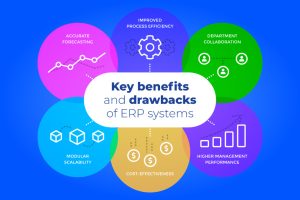The Impact of ERP Systems on Business Efficiency
Introduction
Enterprise Resource Planning (ERP) systems have transformed the way businesses operate by integrating various functions into a single, unified system. This integration allows for more efficient management of resources, streamlined processes, and improved decision-making. Understanding the impact of ERP systems on business efficiency is essential for organizations considering or already using such systems.

1. Streamlined Business Processes
One of the most significant impacts of ERP systems on business efficiency is the streamlining of business processes. ERP systems integrate different departments, such as finance, human resources, supply chain, and sales, into a single platform. This integration eliminates the need for separate, disconnected systems and reduces the redundancy of data entry across departments. As a result, information flows seamlessly across the organization, leading to faster and more efficient operations.
2. Improved Data Accuracy and Consistency
ERP systems centralize data management, ensuring that all departments have access to the same, up-to-date information. This reduces the likelihood of errors caused by manual data entry or data duplication. Improved data accuracy and consistency enable better decision-making and reduce the time spent on correcting mistakes. Additionally, with real-time data access, businesses can respond more quickly to market changes and customer needs, further enhancing efficiency.
3. Enhanced Collaboration and Communication
ERP systems foster better collaboration and communication within an organization. By providing a unified platform where different departments can share information and work together, ERP systems break down silos and encourage a more collaborative work environment. This improved communication leads to faster resolution of issues, more informed decision-making, and a more cohesive approach to achieving business goals.
4. Optimized Resource Management
Effective resource management is crucial for business efficiency, and ERP systems play a key role in optimizing the use of resources. By providing visibility into inventory levels, production schedules, and workforce availability, ERP systems enable businesses to allocate resources more effectively. This optimization reduces waste, minimizes downtime, and ensures that resources are used where they are needed most, leading to cost savings and improved operational efficiency.
5. Reduced Operational Costs
ERP systems can significantly reduce operational costs by automating routine tasks and reducing the need for manual intervention. Automation streamlines processes such as order processing, payroll, and financial reporting, freeing up employees to focus on more strategic activities. Additionally, the improved efficiency and accuracy provided by ERP systems reduce the costs associated with errors, delays, and rework. Over time, these cost savings contribute to a better bottom line for the organization.
6. Better Compliance and Risk Management
Compliance with industry regulations and standards is critical for businesses, and ERP systems help ensure that organizations meet these requirements. ERP systems can automate compliance reporting and provide audit trails, making it easier to adhere to regulations and avoid penalties. Additionally, the enhanced visibility and control provided by ERP systems enable better risk management by identifying potential issues before they become significant problems.
7. Improved Customer Satisfaction
ERP systems can have a direct impact on customer satisfaction by improving the efficiency and accuracy of customer-facing processes. For example, ERP systems can streamline order fulfillment, ensuring that customers receive their products on time and as expected. Additionally, the ability to access real-time customer data allows businesses to provide more personalized service and respond more quickly to customer inquiries or issues. Satisfied customers are more likely to remain loyal and provide repeat business, contributing to long-term success.
8. Scalability and Flexibility
As businesses grow, they need systems that can scale with them. ERP systems are designed to be flexible and scalable, allowing organizations to add new functionalities, users, or locations as needed without disrupting existing operations. This scalability ensures that businesses can continue to operate efficiently as they expand, without the need for costly system overhauls.
Conclusion
The impact of ERP systems on business efficiency is profound, touching nearly every aspect of an organization’s operations. By streamlining processes, improving data accuracy, enhancing collaboration, and optimizing resource management, ERP systems enable businesses to operate more efficiently and effectively. The result is not only cost savings but also improved customer satisfaction, better compliance, and the ability to scale operations as the business grows. For organizations looking to stay competitive in today’s fast-paced market, investing in an ERP system is a strategic move that can yield significant long-term benefits.
